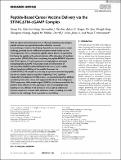Peptide‐Based Cancer Vaccine Delivery via the STINGΔTM‐cGAMP Complex
Author(s)
He, Yanpu; Hong, Celestine; Fletcher, Samantha J; Berger, Adam G; Sun, Xin; Yang, Mengdi; Huang, Shengnan; Belcher, Angela M; Irvine, Darrell J; Li, Jiahe; Hammond, Paula T; ... Show more Show less
DownloadPublished version (1.940Mb)
Publisher with Creative Commons License
Publisher with Creative Commons License
Creative Commons Attribution
Terms of use
Metadata
Show full item recordAbstract
With the advent of bioinformatic tools in efficiently predicting neo-antigens, peptide vaccines have gained tremendous attention in cancer immunotherapy. However, the delivery of peptide vaccines remains a major challenge, primarily due to ineffective transport to lymph nodes and low immunogenicity. Here, a strategy for peptide vaccine delivery is reported by first fusing the peptide to the cytosolic domain of the stimulator of interferon genes protein (STINGΔTM), then complexing the peptide-STINGΔTM protein with STING agonist 2'3' cyclic guanosine monophosphate-adenosine monophosphate (cGAMP). The process results in the formation of self-assembled cGAMP-peptide-STINGΔTM tetramers, which enables efficient lymphatic trafficking of the peptide. Moreover, the cGAMP-STINGΔTM complex acts not only as a protein carrier for the peptide, but also as a potent adjuvant capable of triggering STING signaling independent of endogenous STING protein-an especially important attribute considering that certain cancer cells epigenetically silence their endogenous STING expression. With model antigen SIINFEKL, it is demonstrated that the platform elicits effective STING signaling in vitro, draining lymph node targeting in vivo, effective T cell priming in vivo as well as antitumoral immune response in a mouse colon carcinoma model, providing a versatile solution to the challenges faced in peptide vaccine delivery.
Date issued
2022-08Department
Koch Institute for Integrative Cancer Research at MIT; Massachusetts Institute of Technology. Department of Chemical EngineeringJournal
Advanced Healthcare Materials
Publisher
Wiley
Citation
He, Yanpu, Hong, Celestine, Fletcher, Samantha J, Berger, Adam G, Sun, Xin et al. 2022. "Peptide‐Based Cancer Vaccine Delivery via the STINGΔTM‐cGAMP Complex." Advanced Healthcare Materials, 11 (15).
Version: Final published version